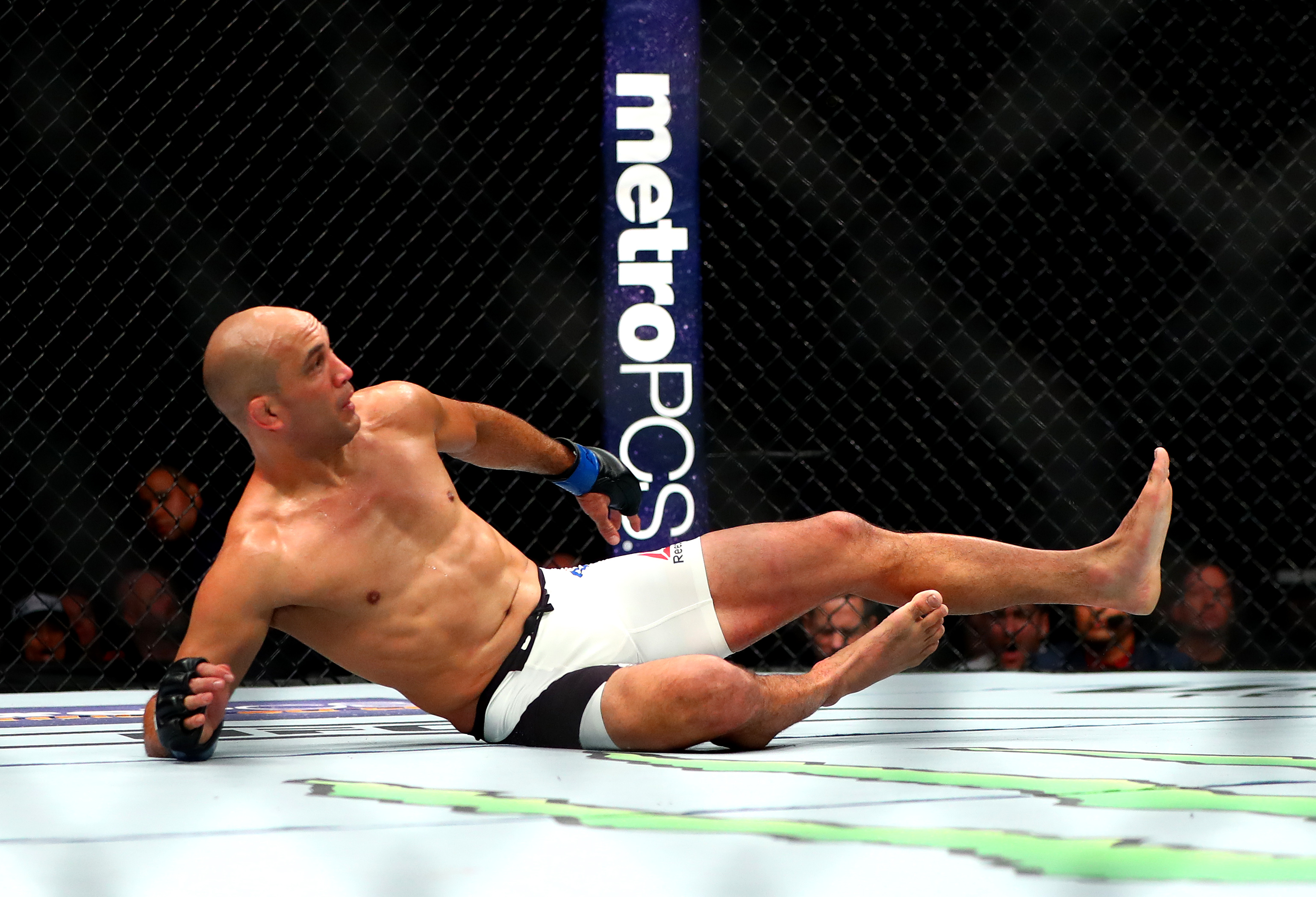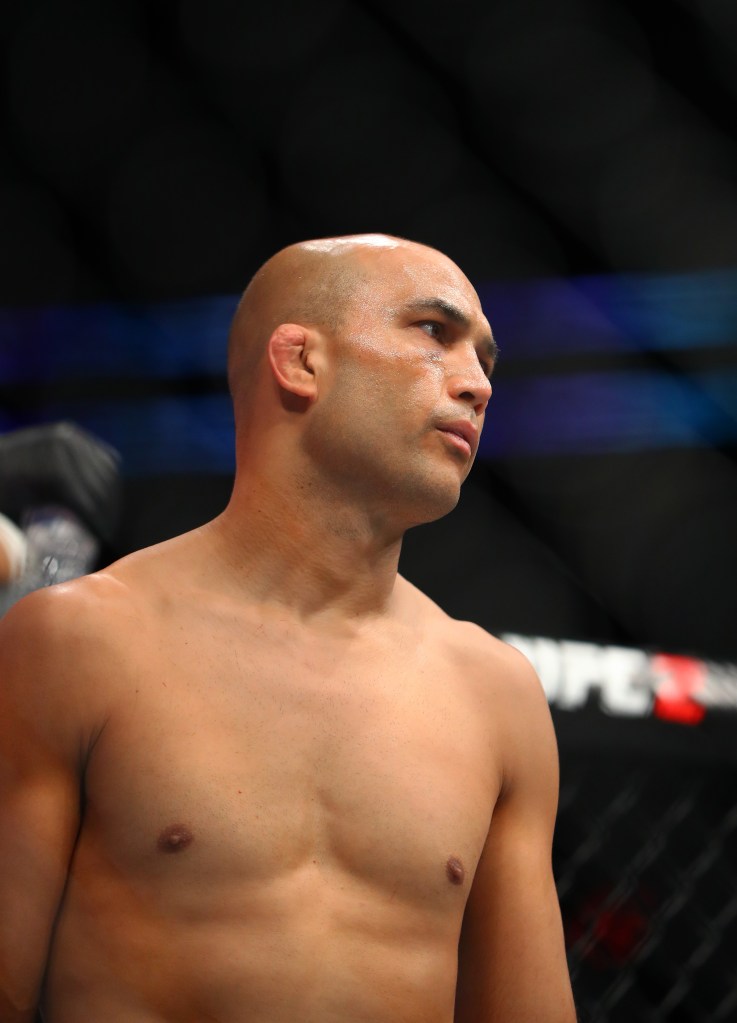BJ Penn’s finish of Sean Sherk came in the middle of his violent argument for being the greatest 155-pounder the UFC has seen so far. The lightweight title fight with Sherk at UFC 84 was a unification bout of sorts, after Sherk had been stripped of the 155-pound belt after failing a drug test a year earlier. It was also a small-gloves boxing match where stubby-armed Sherk never stood much chance as Penn, the longer, looser fighter, summoned all of his brilliance for three clear-cut rounds. The finish came in the closing seconds of the third. Punches pushed Sherk into the face. A flying knee put him down. Ground and pound ended it all over the din of the horn.
If you’re wondering why nine-year-old fight is suddenly relevant (and why the UFC made Penn’s finish of Sherk the latest KO of the Week), it’s because Penn is fighting once again, and the circumstances couldn’t be more different for Penn this Sunday at UFC Fight Night 112 than they were at UFC 84. Instead of defending his lightweight title, Penn is shrinking down to 145 pounds for a fight with journeyman Dennis Siver. It’s been six months since Penn, who turns 39 in December, came out of retirement and became the celebrity scalp for featherweight prospect Yair Rodriguez, who TKO’d Penn 24 seconds into the second round. It’s been seven years since Penn knocked out Matt Hughes. Five fights later and without a win since, his record stands at 16-11-2.
Videos by VICE
One great thing about MMA is that a fighter’s wins and losses only matter to a point. In boxing, a few bad nights can turn you from prospect to tomato can. Meanwhile Randy Couture, rightly regarded as an all-time great, finished his career (probably) with a record of 19-11. MMA is a big tent for fighting styles—there are so many ways to lose, even if you’re really good. And for years, Penn’s losses were a side effect of ambition: a UFC title defeat four fights into his MMA career, a decision loss to Lyoto Machida after Penn ate himself up to 191 pounds, and losses to Hughes (whom he’d already beat for the 170-pound title) and Georges St.-Pierre in fights where he put both in danger.
Penn still won, mostly, and it was easy to be pleased when he did. He was a jiu-jitsu fighter with knockout power and a stoner surf bum persona that contrasted the prevailing Orange County knucklehead mentality. Along with Couture, he was one of the first two-division champions in the UFC. Between 2007 and 2009—a second superfight loss to GSP notwithstanding—Penn ran over Sherk, Jens Pulver, Joe Stevenson, Kenny Florian, and Diego Sanchez. By coupling his talents with elite conditioning, he made “motivated BJ Penn” into a meme and a synonym for how threatening a lightweight fighter could actually be.
Then he ran into Frankie Edgar twice, losing and failing to regain his 155-pound title. Penn went 1-0-1 in a return to welterweight, then the losses started piling up—to Nick Diaz in 2011, to Rory MacDonald in 2012—and he looked progressively outmatched. After a long hiatus, he returned at featherweight for a third fight with Edgar in 2014, where Edgar delivered a thorough, sad beating, and Penn seemed to take solace in the aftermath. “If I didn’t make this night happen for myself, I would have always wondered and went back and forth and begged [UFC president] Dana [White] to let me back in,” Penn said at the post-fight press conference. “I guess I needed some closure.”

Closure is a fleeting thing, apparently. After more than a year of delays, during which his return opponent switched from Siver to Cole Miller to Ricardo Lamas, Penn found himself headlining a fight card against Rodriguez in January and getting kicked in the face. If that loss had broader implications than a lapse in strategy, Penn doesn’t seem to see them. Speaking to his eponymous website, he said, “…Why didn’t I just slam [Rodriguez] on his head like Frankie Edgar and just fuck him up on the ground? You know what I mean? I pushed him on the fence, but I didn’t even grab his legs once. But you know, that’s how I was training back then. I was training for some different stuff. Now it’s the ABCs, the basics. But I believe I could have taken Yair down.”
Knowing when to tell a fighter to hang up his gloves for his own health and safety, and how to balance those concerns against a fighter’s right to self-determination, is an evergreen theme in combat sports. Jason Parillo, Penn’s longtime coach, told MMA Junkie after the Rodriguez bout, “…Sometimes people think I should encourage him not to fight, and it’s not like I don’t. If we’re going to have outcomes like that [Rodriguez fight] time and time again, (I’d say), ‘No, don’t fight. I love you, you’re my friend, we don’t want to do this situation.’ As a coach, I know he’s going to be fighting.”
Since they can’t get him to stop, the people in Penn’s orbit have worked around it. Instead of being fed to up and comers, fights like the one against Siver—a gatekeeper with a fun, side-kick-happy, telegenic style—are what Parillo has in mind. Certainly, there’s an appetite for aging fighters scrapping with opponents from the same generation, but the fact that this fight sneaks up on the undercard of a Sunday night in Okalahoma City suggests the UFC has lost its appetite for Penn as a marquee attraction. That’s an encouraging sign that balances two competing interests: Penn fights under bright lights to his satisfaction, and the promotion that profits from his choice avoids looking too unseemly.
Siver is a winnable fight for Penn no matter the stage of his career. And as long as the pre-fight health and safety guardrails hold up, there will be other bouts for Penn—as many as he wants. No matter which column tallies another number on Sunday, though, Penn will face the same question: how much more is enough?
More
From VICE
-

(Photo by David Eulitt/Getty Images) -

Screenshot: YouTube/Netflix -

VICE host Matt Shea with Andrew Tate, before their relationship went south. Credit: VICE/BBC

